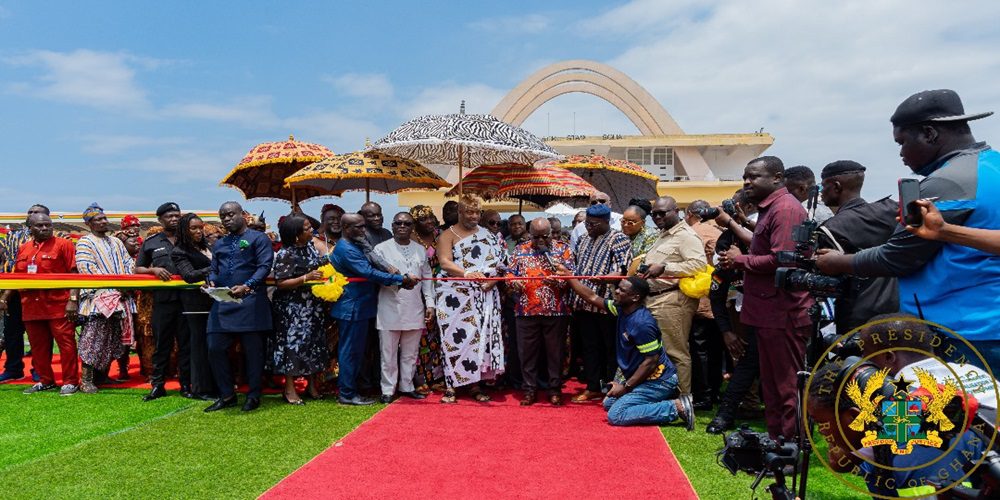Government has commissioned a fleet of 2,240 pieces of equipment under the District Road Improvement Programme (DRIP) in a significant move to enhance Ghana’s road networks and decentralize development.

The fleet, which includes motor graders, backhoes, rollers, wheel loaders, bulldozers, tipper trucks, concrete mixers, water tankers, and low beds, aims to empower Metropolitan, Municipal, and District Assemblies (MMDAs) with the necessary resources to rehabilitate and maintain roads within their jurisdictions.
Creating jobs and enhancing infrastructure
The DRIP project is expected to create around 10,000 jobs for mechanics, engineers, and artisans, significantly boosting local employment. During the commissioning event in Accra, President Nana Addo Dankwa Akufo-Addo underscored the critical role of road infrastructure in economic growth and social development.
He acknowledged that, despite progress, many district roads remain in poor condition, hindering economic activities and development.
“Roads connect communities, facilitate trade, enable access to education and healthcare, and ultimately improve the quality of life for the citizenry,” President Akufo-Addo stated.

Committee oversight and accountability
The President outlined that a four-member committee at each MMDA will oversee the implementation of the programme, ensuring high standards of quality and accountability.
These committees will include technical officers from the Ministry of Local Government, Decentralisation and Rural Development, and the Ministry of Roads and Highways, along with a representative from the 48 Engineer Regiment of the Ghana Armed Forces.
The Metropolitan, Municipal, and District Chief Executives (MMDCEs) will chair these committees.
Historical achievements and future plans
Recounting past achievements, President Akufo-Addo noted that his administration completed 12,830 kilometers of roads from 2017 to December 2023, compared to 4,636 kilometers completed during the Mills/Mahama era from 2009 to 2016.
Current projects include ten new interchanges, with five expected to be completed by the end of the year and five more by 2025.
The President called for a collaborative approach to the success of the DRIP and urged MMDCEs to adhere to the operational manual issued by supervising ministries and stakeholders, ensuring proper use and maintenance of the equipment.
He also emphasized the need for the Ministry of Local Government, Decentralisation and Rural Development to establish monitoring and evaluation mechanisms to track progress and ensure accountability.

Support from Jospong Group
Joseph Siaw Agyepong, founder and Executive Chairman of the Jospong Group of Companies, highlighted that about 2,000 personnel have already been employed for the assembly of the equipment with the assistance of the Ghana Armed Forces’ 48th Engineer Regiment.
He emphasized the project’s commitment to local content, with the majority of the equipment being assembled in Ghana, aligning with the broader vision of fostering home-grown solutions to national challenges.
Technical training and support
Jospong Group plans to sign a Memorandum of Understanding (MoU) with technical universities across Ghana and partners from Legon and Lanzhou University in China to train Ghanaian students in mechanical, electrical, and auto engineering disciplines.
This collaboration will offer skill training, exchange programs, internships, and employment opportunities, further empowering the youth and enhancing the technical expertise required to sustain the initiative.
To ensure the longevity and efficiency of the equipment, 32 mobile service vans equipped with necessary tools will provide 24-hour after-sales service across various districts.
Additionally, the equipment will feature tracking and telemarketing devices for real-time monitoring, and a state-of-the-art 24-hour call center will assist equipment operators facing issues, ensuring support across all 261 districts.

Sanitation parks and future investments
Agyepong also recalled the 2020 initiative to construct sanitation parks in all 16 regions for handling liquid, solid, and medical waste.
He noted that 11 of these facilities have been fully commissioned, with all 38 plants expected to be completed by the end of September.
Minister of Local Government, Decentralisation and Rural Development, Martin Adjei-Mensah Korsah, described the handover of road construction equipment to the MMDAs as unprecedented in Ghana’s history.
He expressed confidence that the equipment would improve the conditions of road networks in both rural and urban areas, enhancing the mobility of goods and services and deepening trade and accessibility to basic services.
Investment in road infrastructure
Minister of Finance, Dr. Mohammed Amin Adam, highlighted the government’s investment of over GH₵10 billion in road infrastructure development since January 2024.
He noted that the DRIP initiative represents a significant milestone in enhancing road infrastructure development in Ghana, contributing to the overall development of local assemblies and creating numerous job opportunities.
Minister of Roads and Highways, Francis Asenso-Boakye, assured that the ministry and its affiliate agencies would provide the necessary technical assistance at both national and district levels to ensure the effective execution of the initiative.
He noted that the machinery and equipment provided for the DRIP were assembled locally under the supervision of the 48th Engineering Regiment of the Ghana Armed Forces.

Strategic objectives for local economic growth
Administrator of the District Assemblies Common Fund (DACF), Irene Naa Torshie Addo-Lartey, expressed optimism that the DRIP initiative would help local businesses, enhance accessibility, and stimulate regional economic growth.
She emphasized that the delivery of the equipment is part of the government’s strategic objective to structurally enhance the ability of the MMDAs to attain district-level economic independence.
The DRIP initiative marks a visionary step towards sustainable development in Ghana, with the potential to transform the nation’s road infrastructure, stimulate local economies, and improve the quality of life for all citizens.
- Friday, May 9, 2025 Newspaper Headlines - 9 May 2025
- Adangabey brightens rural kids’ future from his wheelchair - 9 May 2025
- Stanbic donates ICT equipment to UHAS for digital learning - 9 May 2025




